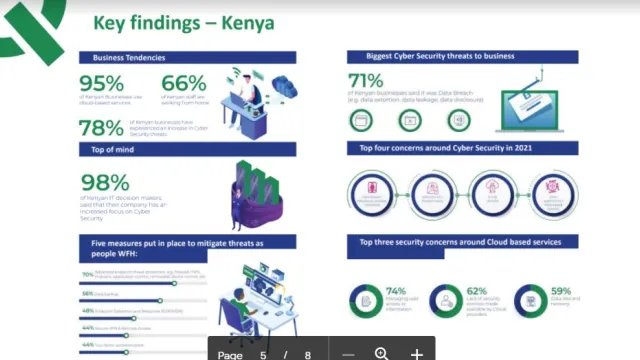Pandemic triggers surge in cyber-attacks in Africa — survey

Pandemic triggers surge in cyber-attacks in Africa — survey
About eight in ten businesses in Kenya, South Africa and Zimbabwe attribute an increase in cyber-attacks this year to the advent of working from home.
This is the finding of the latest 2021 industry survey by pan-African technology group Liquid Intelligent Technologies.
To counter the rising threat, an estimated 90 per cent of IT decision makers in the three countries have stepped up their companies' cyber security controls.
The study established breaches such as data extortion, leakage and unauthorised disclosure as some of the biggest concerns about cyber security this year.
Data breaches constitute almost 71 per cent of cyber-attacks for Kenyan businesses while over 70 per cent of South African firms and Zimbabwean organisations consider email attacks such as phishing as the prime digital threats.
Read also: Auditor pulls back the curtain on Galana Kulalu scandal
Interestingly, respondents reported increased use of cloud-based services this year at 96 per cent in South Africa, 95 per cent in Kenya and 75 per cent of businesses in Zimbabwe.
This comes in the wake of organisations embracing Microsoft Office 365, Teams, Zoom, Google Workspace, Microsoft Azure, and Amazon Web Services across Africa around the world.

As a result, cyber threats and concerns seem to be spiralling up as millions of workers keep shifting to work via digital platforms.
According to the research, managing user access to information, data loss and recovery, visibility and control of data, as well as compliance challenges remain some of the biggest concerns for organisations.
Some of the biggest security concerns cited by businesses using cloud services are managing user access to information, data loss, recovery and lack of security controls made available by cloud providers.
The research also pointed out email attacks, web-based attacks, social engineering, malware, ransomware and data breaches to be the top cyber security concerns this year.
Ignus de Villiers, Group Head of Cyber Security, Liquid Intelligent Technologies, says, “The result of our research confirms that cyber security should be at the centre of every business conversation and emphasises the need to establish an appropriate cyber security framework that matches the business environment. Critically, the framework must look beyond technical security controls to include information security management covering governance, risk, compliance, people, processes and technology”.



